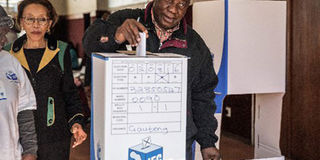Army deployed in S. Africa as local council polls begin

South African deputy president Cyril Ramaphosa casts his ballot as a special vote on the eve of South Africa highly contested municipal elections on August 2, 2016 in Johannesburg, South Africa. South Africans will head to the poll to vote in the municipal elections on August 3, 2016. PHOTO | AFP
What you need to know:
- South Africa, has in recent months, been rocked by violent protests.
- Former President Thabo Mbeki was scheduled to host the ruling ANC’s Gauteng mayoral candidates at his home on Tuesday.
NATION Correspondent and Agencies
PRETORIA, Tuesday
South Africa President Jacob Zuma has deployed more than 2,000 members of the army to assist the police maintain law and order during Wednesday’s local government elections.
South Africa, has in recent months, been rocked by violent protests. The increase in protests and the growing frustration with the ruling ANC have led many to question whether South Africa would maintain its tradition of peaceful elections.
However, President Zuma has assured that tight security measures were in place to ensure that no criminal or violent incidents mar Wednesday’s elections.
About 28 million prospective voters are expected to cast their ballots.
“We are looking forward to a peaceful election day with no intimidation. There have been intimidation activities that took lives of people. We want people to be assured that they will vote without any interference,” said President Zuma.
Meanwhile, former President Thabo Mbeki was scheduled to host the ruling ANC’s Gauteng mayoral candidates at his home on Tuesday.
The meeting comes after the former ANC leader met Julius Malema’s Economic Freedom Fighters (EFF) members on Monday, who are participating in their first local election this year.
The three mayoral candidates: Mr Parks Tau, Ms Thoko Didiza and Mr Mzwandile Masina meet Mr Mbeki as the governing party winds up its election preparations.
The ANC confirmed that Mr Mbeki will meet City of Johannesburg Metropolitan Municipality’s Tau, City of Tshwane Metropolitan Municipality candidate Didiza and Ekurhuleni Metropolitan Municipality’s Masina at his home in Johannesburg.
SPECIAL VOTING CONTINUES
Mr Malema told journalists after the Monday meeting that discussions centred “on the future of Africa and our country”.
Meanwhile, special voting continues countrywide after it got off to a smooth start on Monday.
Over 200 political parties and 61,000 independent candidates are participating in the municipal polls.
In the last municipal vote in 2011, the ANC took Pretoria by 56 per cent, while the the main opposition Democratic Alliance (DA) garnered 39 per cent.
A latest poll by Ipsos showed the DA ahead in Nelson Mandela Bay (Port Elizabeth), Tshwane (Pretoria) and Johannesburg.
The DA, previously seen as the party for middle-class whites, is running under its first black leader Mmusi Maimane, who hopes to vastly extend the party’s appeal.
The EFF, led by Mr Malema, is standing in its first municipal elections, and could emerge as a major player with its populist calls for land redistribution without compensation and nationalisation of the mines.
“The ANC may be in decline, but it still stands a chance of winning the election overall,” said Susan Booysen, a political analyst at the University of the Witwatersrand, urging caution over predicting the results.
“The ANC realises the difficult position it’s in, and has pulled all the stops to ensure that it retains the key metros.”
She added that recent violent protests were not necessarily a sign of rejection of the current government.
“Communities often use the protests as a way of communicating the ANC,” she said.
The party has roped in anti-apartheid stalwarts such as Winnie Madikizela-Mandela, former wife of Mandela, to urge people to vote for the liberation movement.
The DA has also regularly evoked Mandela’s name in its campaign, much to the ANC’s chagrin.




